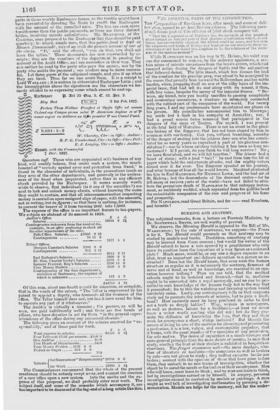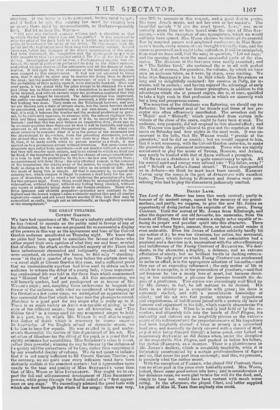BURRING AND ANATOMY.
THE subjoined remarks, from a lecture on Forensic Medicine, by Dr. SOUTHWELL SMITH, are well worthy of perusal. We observe, the Morning Herald is opposed to the Bill, of Mr. WARBURTON ; by the rule of contraries,- we suppose—the Times is for it. The Herald would perstiade us that anatomy may be studied by models and hooks. Doubtless, something of anatomy may be learned from these sources ; but would the writer of the Herald submit to have a vein opened by a practitioner who only knew its position from the inspection of a wax figure or a coloured plate ? Much more, would he, or any one a degree superior to an idiot, trust an important and delicate operation to a person so in- structed? Does not the Herald know, that even were the human structure as regular as it is notoriously the contrary, firmness of nerve and of hand, as well as knowledge, are essential to an ope- ration however trifling ? Then we are told, that the medical schools ought to be watched and licensed,—that is, medicine ought to be converted into a royal monopoly, and no one be per- mitted to seek knowledge of the human body but in the way that it prescribed ; for to this the watching and licensing system would inevitably come. Lastly, our contemporary tells us that surgeons study not to promote the interests of science, but to gain a liveli- hood ! How earnestly must he have pondered in order to find out a truth so deeply hidden ! Why, writers in newspapers, as well as doctors, labour for a livelihood,—at least we never knew a writer worth reading who did not ; but do they pro- mote the diffusion of knowledge the less, that they sell their work for sevenpence a sheet, stamp included? But though the means of living be one of the motives for choosing and prosecuting a profession, it is a low, vulgar, and contemptible prejudice, that it forms, with the great number of the members of any profession, the sole motive. The desire of reputation is a much stronger and more general principle than the mere desire of income, in men that study, whether the fruit of their studies is exhibited in hospitals or elsewhere. The fruges consuntere nail—the mere drudges, whe- ther of literature or medicine—the composers as well as healers by rule—are not given to study ; they neither examine books nor bodies ; content with the opinions of those that have gone before them, they embark in no new trains of investigation, whether the object be to mend the minds or the bodies of their countrymen. Men who will know, must learn to think ; and no in an can learn to think, but by investigations carried on by himself. In surgery, personal investigation cannot be carried on by models or paintings. A man might as well talk of investigating mathematics by perusing a de- monstration. Models are helps for the memory,.not for.the under-
standing. If the latter is to he cnitivated, bodies•minst he got ; and if bodies be got, the existing, law must be violated less or more ; there mss t he resurrectionists, or Burkers—probably bo:11. But let us hear Dr. SIIITH-
" Did ever any civilized country v.-itless such a situation as that in which the law has placed. you and the public? It has contrived to raise the price of the dead body to such a height, as absolutely and tin- to endanger the safety of the living. 01 this danger both the public and the Legislature have been long and earnestly warned. Several years ago, before any instance of the actual perpetration of the crime had been discovered, the temptation and the consequent Barg, r were fully brought to view in a pamphlet entitled The Use of the Dead to the Investigation was set on foot, a Parliamentary inquiry was ob- tainud, the medical profession performed its duty in the fullest manner, and stated without reserve all the odiousness and all the danger of exhu- mation. It laid open the true character of the hardened and desperate men engaged in this employment. It had not yet occurred to those men, that it might he more easy to murder the living than to disturb the dead; but the possibility of the occurrence of such a thought, and the probability of their acting upon it, were distinctly foretold. Over and over again, it was stated that the price always.to be obtained for a.sub- ject (from -ten to fifteen guineas) was a temptation to murder not likely to be resisted, and with an earnest voice the profession implored that this risk might no longer be incurred. The Administration was impressed, the public was excited; something was promised, a little was attempted, but nothing was done. Then came on the Edinburgh horrors; and now -we are thrown into a state of intense alarm, lest the same horrors should be perpetrated, and are perpetrating, at our own doors: And knowing this, it is said, it behoves the teacher and the medical profession in gene- ral, to he extremely cautious, to examine with the utmost vigilance whe- ther any thing suspicious appear, and if it do, to investigate it to the bottom.: and that this has now become an imperative duty, there can no be no more question than there can be that it will be faithfully and rigidly observed in all schools, and throughout the profession. But when you come seriously to consider what it is in the power of the anatomist and the physiologist to do,—when, from the preceding statements, you see the utmost they can do, the truth is not more true than it is dreadful. If, then, it be made worth while to pursue murder as a trade, it can carried on to a prodigious extent without detection. But men—even the desperate men called body-snatchers—will not murder without a motive ; but they will murder upon system, and to an extent to which no limit can be fixed, if the temptation be great, and the chance of escape considerable. It is vain to look for protection to the law—no law can restrain them ; no punishment will deter them : the only effectual remedy is the removal IA the temptation, the taking away of the motive, by rendering the dead body so cheap as to be in fact without • value as an article of sale. And the mode of doing this is simple. All that is necessary is, to repeal the existing law, which renders it illegal to possess a dead body for the pur- pose of dissection, and to enact a law rendering the possession of a body for this purpose legal. .Every thing would then be accomplished without exhumation, without danger, without any feeling being shocked, without any injury or indignity being done to any human creature. Those who, from ignorant and childish prejudice—prejudice now confined to the .highest and the lowest vulgar—raise a clamour against this and all similar expedients—assist and aid every future murder of this kind that may be committed, as really, though not as intentionally, as though they assisted at the strangulation."



























 Previous page
Previous page